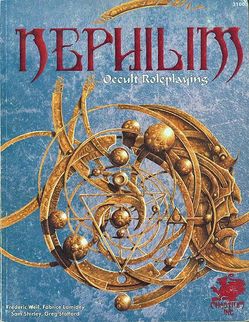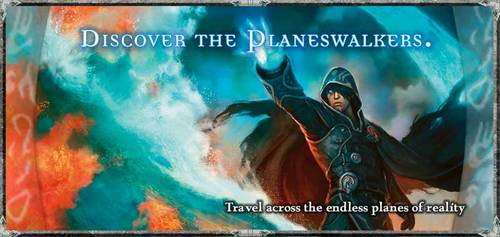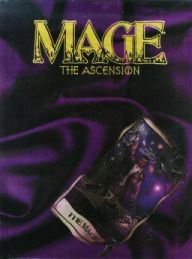This week's blog entry is about magic systems and metaphysics--a topic which is to some extent a natural extension of last week's discussion of magic and horror, which introduced the representation of the supernatural as a defining trait of magic systems. This week's entry actually proceeds out of two coincidental occurrences: one is that I've been playing Magic: The Gathering [1993], Richard Garfield's famed collectible card game about dueling magicians, at lunch. This week I also happened to check out the web site for the game, where I was surprised to find text with a certain amount of metaphysical profundity and beauty.
The current expansion of Magic: The Gathering continues to develop the theme of Planeswalkers. In the mythos of Magic, each player is a Planeswalker, a dimension-hopping magician who duels with other mages by casting spells and summoning creatures. Planeswalkers are also a card type that functions somewhat similarly to an extra player or ally, with the ability to cast spells and summon creatures in addition to those cast or summoned by the player.
The website's description of a Planeswalker is quite striking and poetic, as in this excerpt:
a planeswalker's life is consumed with the exploration of the Multiverse, the discovery of strange secrets and experiences, and the plumbing of the depths of one's own mystic soul. The life of a planeswalker is a life of choice and self-determination, unrestricted by the boundaries of world or fate. With the freedom to travel and the power of magic, each planeswalker has the power to carve his or her name on the face of history
This description compellingly evokes the life of an adept and an initiate, guided by a triad of mastery, enlightenment, and imaginative travel. The devotion to an exploration of the multiverse echoes long-standing esoteric drive toward astral travel, fueled by an ethos of imaginative exploration that would render the Planeswalker a "mental traveler," in the words of William Blake. Moreover, this flavor text conjoins metaphysical ideas about astral travel with a metaphor for the lifestyle of a hardcore gamer, conceived of as existentially free and engaged with a number of different worlds rather than the single consensual reality of real life (or "RL"). Moreover, the trope of the Planeswalker takes its place within a larger cosmology involving the possession of an inner spiritual "spark" and its awakening through epiphanic enlightenment, often triggered by trauma. This imagery is based on certain strands of Gnostic belief, as described in Hans Jonas' classic Gnostic Religion and scattered throughout popular culture, including the novels of Philip K. Dick and the comic books of Alan Moore.
The strongest magic systems are those that can accommodate a simulation of metaphysics overlaps with and reinforces similar fictions. Continuing with my definitional iterations and revisions, a magic system can now be defined as a set of rules and symbols designed to simulate the alteration of reality by the exertion of the will operating through the agency of a metaphysical force. So what is metaphysics? By definition, that which is beyond the physical. This word is more accurate and inclusive than the similarly-charged term supernatural; metaphysical acknowledges nature-oriented magic (druidism, Wicca, the green side of the color pie) without being restricted to it (since playing with only green mana or druids would result in monotony and a lack of balance).
Is metaphysics just the story surrounding magic in a given game world, its lore? No. Metaphysics is the experience of magic, expressed through its mechanics, visual art, audio, interface, and control scheme. Those magic systems are strongest which can accommodate the richest, most mysterious, interactive experience of metaphysics.
Such an experience does not have to be digital. In addition to Magic: The Gathering, Mage: The Ascension [first edition 1993] and Mage: The Awakening [2005] are quintessentially concerned with the metaphysical implications of magic. Both of these table-top RPG's, set within the same World of Darkness as Vampire: The Masquerade, attempt to render through game mechanics the theme of altering reality through one's perception of it. Consequently, both games feature highly flexible, free-form magic systems that are difficult to express in strict quantitative terms.
Magic within the World of Darkness succeeds to the extent that it can counter the benighted complacency of the Sleepers, ordinary human beings in the grip of consensus reality. Taking a cue from Thomas Kuhn's Theory of Scientific Revolutions, Mage relies on the magician's ability to shift the prevailing paradigm, or belief system that structures reality, into his own paradigm. An excessively overt display of vulgar magic violating the prevailing paradigm will result in a backlash called paradox. While Mage does include general categories of magic called spheres as well as levels of power and their relative cost, it eschews strict spell tables and purely dice-based mechanics. The success of a spell (or even the allowability of a given invented spell made up by a particular player) depends upon the acceptance of the Storyteller (Game Master) and the other players. This reliance on the subjective opinion literalizes the notion of consensus reality and paradigm, implying that the most successful players are those most able to convince others to bend rules and accept the existence of new ones.
Because of this prominent subjective element, the magic system of Mage is extremely hard to implement digitally without reducing or oversimplifying it, though attempts have been made in WodMod, a mod of the Vampire: The Masquerade--Redemption engine to allow for other characters and settings from the World of Darkness, including Mage. Nonetheless, Mage offers one potential answer to a question often raised about how to implement my ideas about magic systems within a multiplayer setting. Latency issues and differing levels of skill among players in an MMO might make changes in interface and alternate controllers risky within such a context, which is part of the reason that my entries tend to focus on single-player console and PC games in which online features are supplementary. However, the most unique feature of a multiplayer game that could be turned to the advantage of magic systems would be the ability of players to improvise socially by judging a particular spell to be acceptable or unacceptable. To be implemented digitally as a mechanic, this feature might be a hybrid of the spheres and power levels from Mage with a conversation-based voting system.
Ultimately, however, the genius of Mage stems less from its multi-player element and more from the exhaustive research with which its designers have enriched it, making the Mage sourcebooks (much like the flavor text of Magic: The Gathering) a joy to read. The Mage designers have read deeply in the Golden Dawn, Thelemic magick, alchemy, freemasonry, Jungian thought, tarot, and Chaos Magick. For example, Chaos Magick, as espoused in the writings of Peter Carroll such as Liber Null and Psychonaut, involves the deliberate shifting of the magician's belief systems in order to alter reality.
The intersection of actual esoteric systems with games raises the spectre of the condemnation of Dungeons and Dragons for supposedly teaching occult beliefs. In order to dodge these accusations, the writers of a game like Mage feel compelled to include caveats that distance their game systems from occult practice, often in the same breath as acknowledging the inspiration provided by occult thought. Nowhere are these paradoxes so pronounced as in Nephilim [1992], a French system now published by Chaosium, which advertises itself in its subtitle as "occult roleplaying."
 Nephilim acknowledges a Wiccan high priest named Donald H. Frew as its lead consultant, who contributes the following endorsement, "In over 20 years of studying the western Mystery Tradition and playing roleplaying games, I have never before encountered a game system that so skillfully blends real-world occult knowledge with an exciting and compelling roleplaying game." Despite the endorsements (or because of them), Nephilim features a caveat spread over two pages, which read "This game is not real" (on the first page) and "You are" (on the second page).
Nephilim acknowledges a Wiccan high priest named Donald H. Frew as its lead consultant, who contributes the following endorsement, "In over 20 years of studying the western Mystery Tradition and playing roleplaying games, I have never before encountered a game system that so skillfully blends real-world occult knowledge with an exciting and compelling roleplaying game." Despite the endorsements (or because of them), Nephilim features a caveat spread over two pages, which read "This game is not real" (on the first page) and "You are" (on the second page). Such a warning begs the question of why the designers would go to such exhaustive research if the game is not real? Surely part of the drive toward research involved creating a sense of authenticity and mood. The second part of the warning ("you are") also becomes a tacit acknowledgement of real-world lessons for the player, perhaps originating from the conviction that experience is experience, whether simulated or real. Indeed, the insistence on an uncrossable rift between reality and make-believe must surely be ironic, taken with a grain of salt, in games whose primary theme is the irreality of the apparently real, the blurring of the line between reality and fantasy.
At the heart of the most compelling magic systems is a cosmology in which another world or worlds lurks just beyond the veil of the visible. In Mage, the power of spells ultimately comes from a shadow-plane called the Umbra, much as in some versions of D & D cosmology spells are powered by energy from the negative and positive material planes. Andrew Plotkin recently and drolly mentioned the frequent environmental spell type of "transform world into creepy and distorted version of itself," as seen in the Soul Reaver games. Yet, the presence of such spells suggests a powerful relationship between magic and transcendence in games, in which magic is an energy drawn from elsewhere, the beyond, the netherworld.
Digital games, with their compelling representation of virtual space, can allow access to a simulation of transcendence Dragon Age [2009] does an excellent job of dramatizing the magician's astral voyage into the surreal dream world of the Fade, from which all magic arises. Demon's Souls [2009] creates a profound metaphysical mystery around the Nexus, the hub between all worlds within which all soul power converges. The metaphysical mysteries of these games are at the heart of their mechanics; to fail the riddles of the Fade is to die, and to understand the currency of souls that flows through the Nexus is the only chance of survival in the world of Boletaria.
Other game mechanics (shooting, throwing a basketball, running, jumping) require only a physics system to implement, which can be imitated more or less directly from the Newtonian physics of our 21st century consensual reality, with allowances made for superhuman powers and the Relativistic or Quantum warping of Portal and Alan Wake. Magic, however, is a mechanic that requires not a physics system but a coherent and engaging metaphysics to succeed as simulation.




One "not completely thought out well" idea I had long ago involved getting player opinions on tweaking MMORPGs. I was thinking in particular of Player-versus-Player combat, where the rules are effectively changed. Most MMOs sit on a mountain of suggestions, implementing none of them and giving poor feedback to its users.
This does bring up an issue: How would you organize the vote to preserve the game's flavor? For example, let's play Mage with a party of munchkins. I'm sure they would allow me to shoot fireballs out my hands without much paradox. If I tried that around my more serious friends I'd pretty much max my paradox in one or two castings. (Max Paradox is bad news. Heck, 4 Paradox was pretty bad when I had to pop it.) Opinions differ.
But maybe the trick is to have good community managers who can sniff out and extract votes from major regions. Maybe regions and zones can have different rules. Final Fantasy 8's in-universe card game comes to mind, where you could virally spread additional rules between cities by playing there.
A consensus based magic system would require good community management and localized rule systems. Pretty much the opposite of what MMOs do today, with the One Ruleset Fits All philosophy. MMOs also aren't used to such direct feedback. Unless it breaks the servers, the suggestions are ignored until the next major update. It would be quite a change for game development today.
Sharp observations, Chad (as usual).
I agree that good community managers would be key for a consensus-based magic system in an MMO or other multiplayer setting. The importance of a dungeonmaster/gamemaster/storyteller in tabletop games partially derives from her ability to improvise, implementing rules flexibly or making up new ones altogether in the interests of game balance and fun. It would be harder for an MMO to exhibit similar flexibility in its rules because of its massive scale, unless (as you suggest) the modification of rules occurred on a regional level (or maybe even an individual instance, or in association with a particular party). Such a degree of management would require an immense overhead in terms of employees, unless players took on the role of "consensus reality managers," somewhat as they currently manage guilds.
It will be interesting to see if the upcoming World of Darkness MMO incorporates elements from Mage and, if so, how the game addresses issues of perception shaping reality. (Unfortunately, the current Mage version-- The Awakening-- did away with a lot of the interesting rules about paradigm and paradox). Since the WoD system deliberately breaks with d20 mechanics in favor of a more flexible story-based system, I wonder how this MMO will handle the issue of community management.